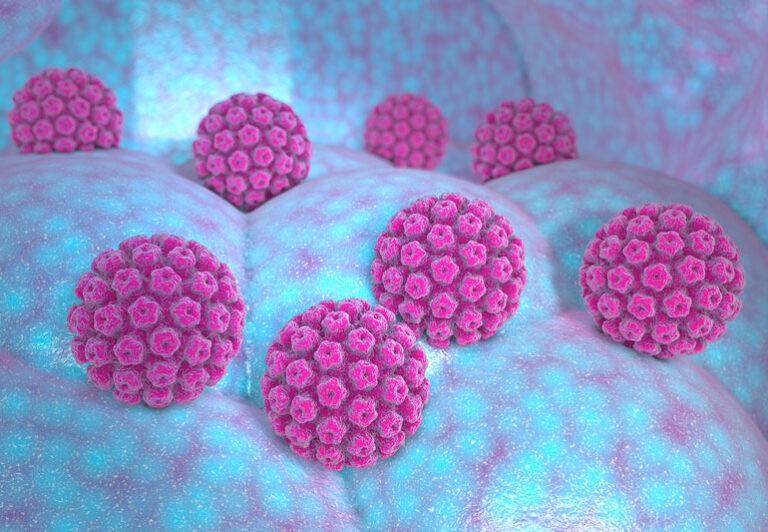Human papillomavirus (HPV) is a common virus that infects the skin and mucous membranes. It is spread through sexual contact and can lead to several health problems, including genital warts and certain types of cancer. It is estimated that almost 80% of people will become infected with HPV at some point in their lives.
There are more than 100 types of human papillomavirus, and they can be divided into low-risk and high-risk. Low-risk HPV types can cause skin warts, such as common warts and plantar warts. These types of HPV usually do not cause cancer. High-risk HPV types, on the other hand, can lead to cancer of the cervix, vulva, vagina, anus, and oropharynx (the back of the throat, including the base of the tongue and tonsils).
Genital HPV infection is usually transmitted through sexual contact, including vaginal, anal, and oral sex. It can also be transmitted through skin-to-skin communication during sexual activity. Rarely, it can be transmitted from mother to child during childbirth.
Symptoms of HPV infections can vary depending on the type of HPV and the location of the infection. Some people with HPV may experience no symptoms at all. In other cases, HPV can cause genital warts, which are small, fleshy growths that can appear on the vulva, cervix, anus, or throat. Genital warts can be treated with topical creams, cryotherapy (freezing warts), or surgical removal.
In some cases, the human papillomavirus can lead to precancerous changes in the cells of the cervix, vulva, anus, or oropharynx. These changes can eventually develop into cancer if left untreated. It is essential to perform regular Pap tests and HPV tests to detect any abnormal cell changes early. Treatment for precancerous cell changes may include cryotherapy, laser therapy, or loop electrosurgical excision procedure (LEEP), in which the abnormal cells are removed using a thin wire loop.
HPV can also cause cancer of the cervix, vulva, vagina, anus, and oropharynx. Cervical cancer is the most common type of HPV-related cancer and is caused by the high-risk HPV types 16 and 18. Other high-risk HPV types, such as 31, 33, 45, 52, and 58, can also lead to cervical cancer. Symptoms of cervical cancer may include abnormal bleeding, pain during sex, and vaginal discharge.
Vulvar cancer is a rare form of cancer that affects the outer female genitalia, including the labia and clitoris. It is usually caused by the high-risk HPV types 16, 18, and 31. Symptoms of vulvar cancer may include itching, burning, and a lump or sore on the vulva.
Vaginal cancer is a rare form of cancer that affects the walls of the vagina. It is usually caused by the high-risk HPV types 16 and 18. Symptoms of vaginal cancer may include abnormal bleeding, discharge, and pain during sex.
Anal cancer is cancer that affects the anus and rectum. It is usually caused by the high-risk HPV types 16 and 18. Symptoms of anal cancer may include pain or pressure in the anus, bleeding from the anus and a change in bowel habits.
Oropharyngeal cancer affects the back of the throat, including the base of the tongue and tonsils. It is usually caused by high-risk HPV types 16 and 18. Symptoms of oropharyngeal cancer may include sore throat, difficulty swallowing, and a lump in the neck.
You can take several steps to reduce your risk of human papillomavirus infection. One of the most effective ways to prevent HPV is to get the HPV vaccine. HPV vaccination is recommended for both men and women and is most effective when given at a young age, usually around age 11 or 12. The vaccine is also recommended for adults up to age 45 who have yet to receive it.
Another way to reduce the risk of HPV infection is to practice safe sex. Using condoms during sexual activity can help reduce the risk of transmission. It is also essential to limit the number of sexual partners you have because having multiple sexual partners increases the risk of HPV infection.
Practicing good hygiene, such as washing your hands and avoiding personal items such as towels and razors, is also essential. This can help reduce the risk of transmission through skin-to-skin contact.
If you have been diagnosed with HPV, it is essential that you follow your healthcare provider’s treatment and follow-up care recommendations. This may include regular Pap tests, HPV tests, and other procedures to check for any abnormal cell changes.
Human papillomavirus is often transmitted through sexual contact. It can cause several health problems, including genital warts and certain types of cancer. The best way to prevent HPV infection is to get the HPV vaccine and practice safe sex.
The information in this article was obtained from the following sources:
- Center for Disease Control and Prevention. (2021). Human papillomavirus (HPV). Picked up from https://www.cdc.gov/hpv/index.html
- World Health Organisation. (2021). HPV and HPV vaccines. Picked up from https://www.who.int/teams/health-product-policy-and-standards/standards-and-specifications/vaccine-standardization/human-papillomavirus
- American Cancer Society. (2021). HPV and cancer. Picked up from https://www.cancer.org/cancer/risk-prevention/hpv.html

